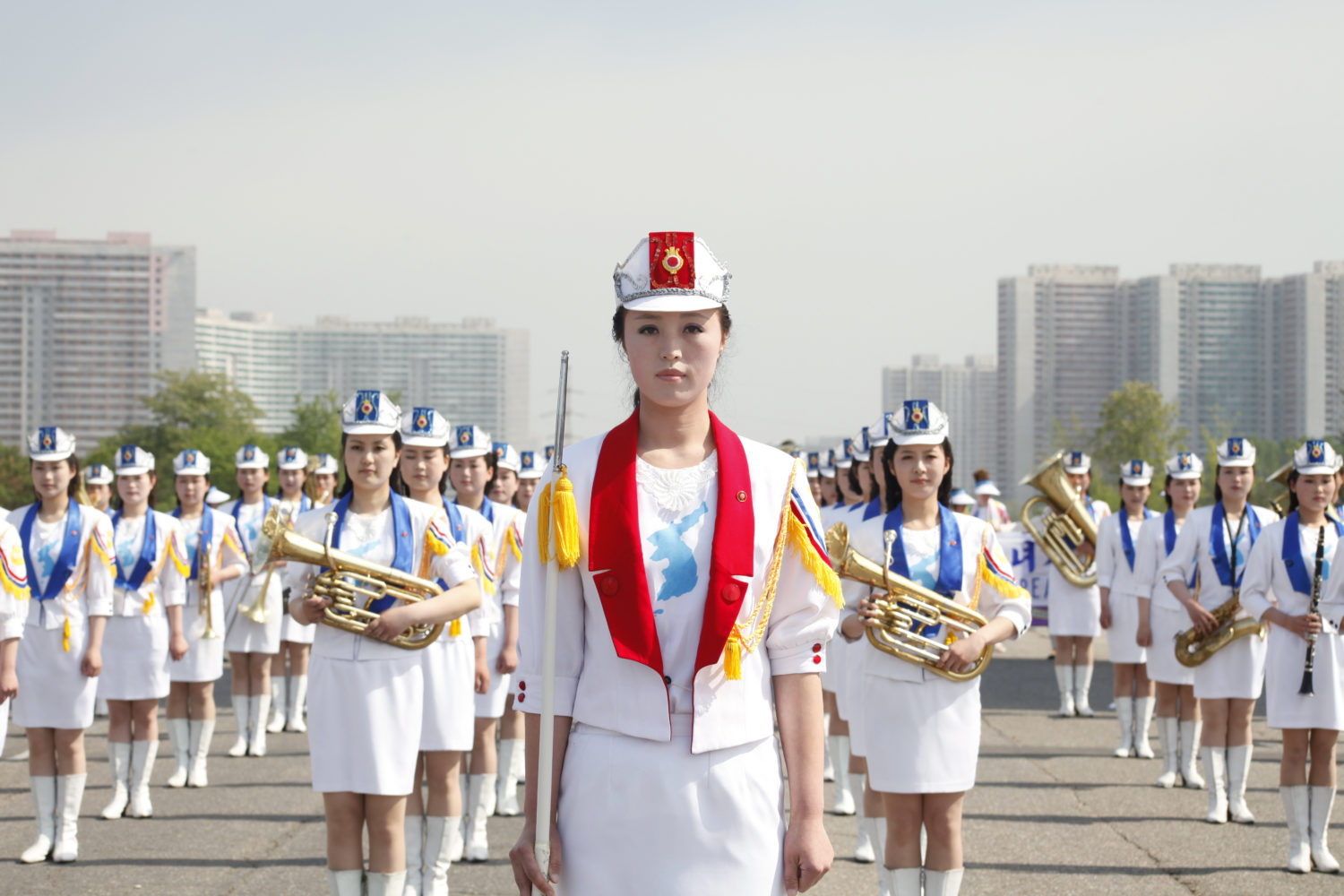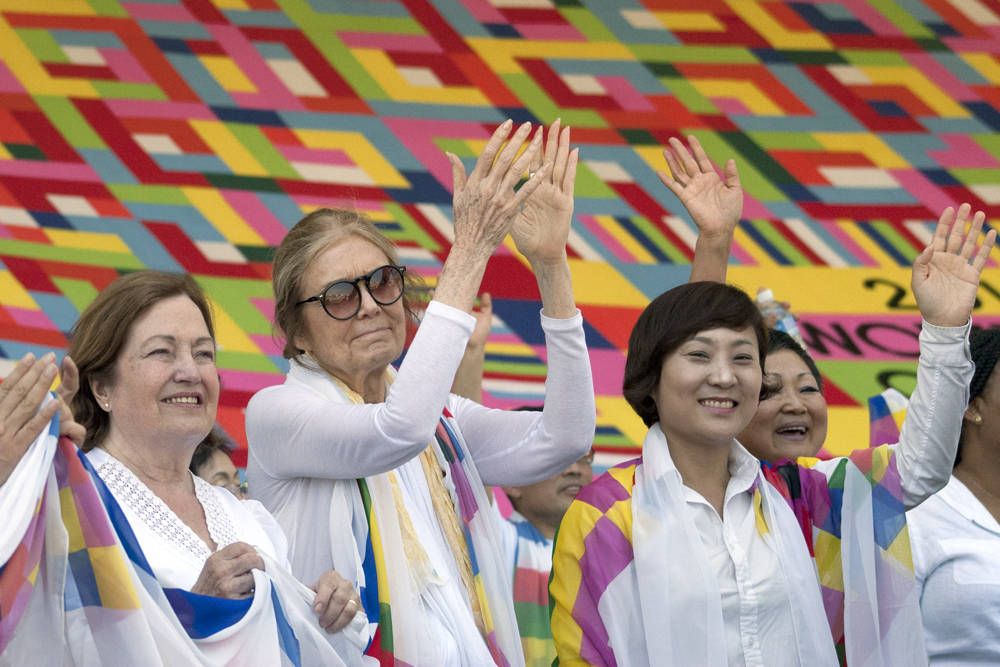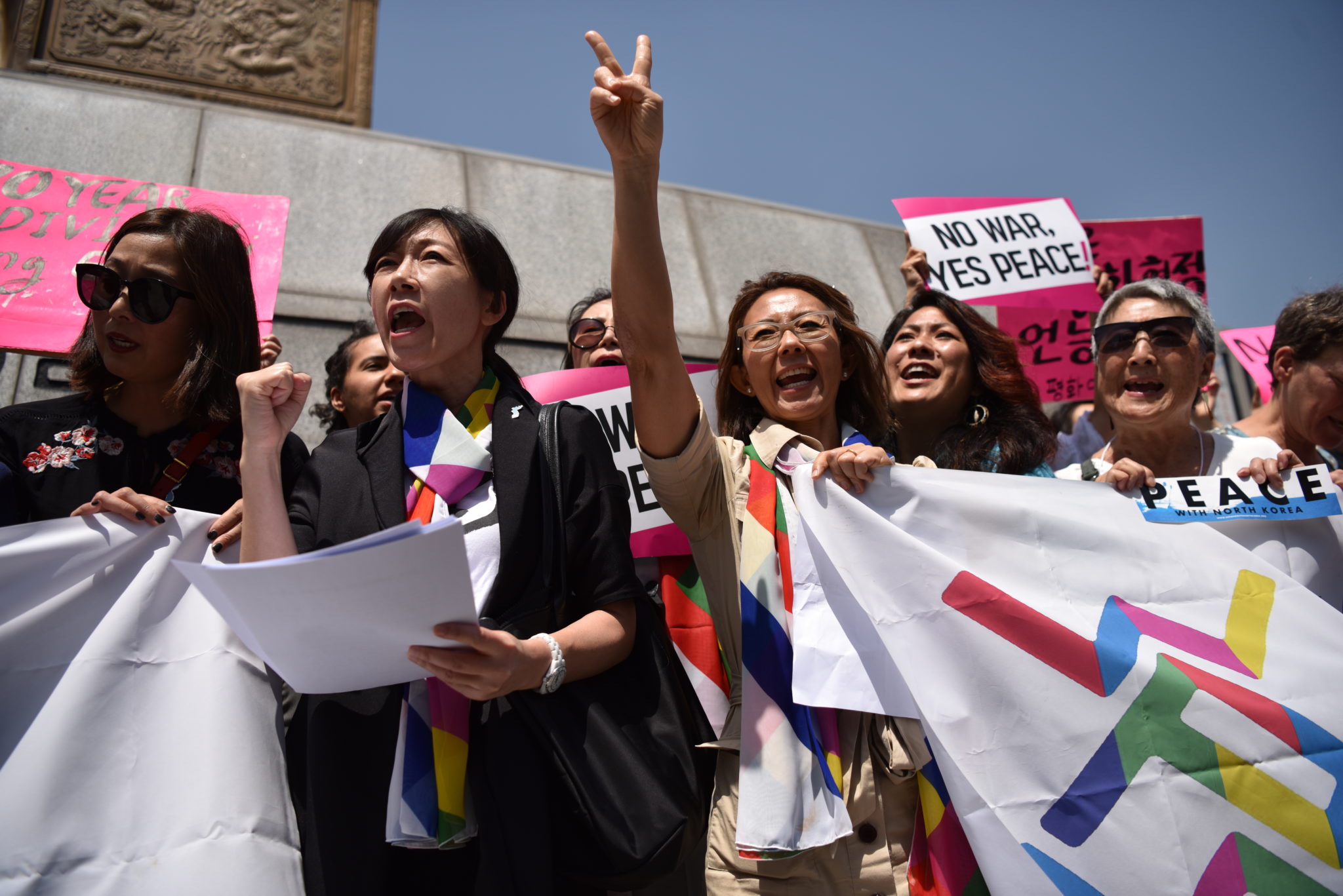In the new documentary film Crossings, international activists mobilize the charge toward peace on the Korean peninsula. A Honolulu organizer highlights how Hawai‘i can play a key role.
On our war-wounded planet, some conflicts are acute, some chronic, and still others defy simple diagnosis. Nowhere is this truer than the Korean peninsula where, for more than 70 years, a divided nation remains in a state of war.
From 1950 to 1953, a brutal war took place on ground and air between the Democratic People’s Republic of Korea in the north, backed by China, and the Republic of Korea in the south, backed by the United States. This war inflicted death and destruction, causing millions of mostly civilian casualties. A 1953 armistice signed by the United Nations Command, China, and North Korea halted active fighting, but a formal peace treaty was never concluded, leaving Korea in a technical state of war.
Today the Korean peninsula remains divided by a demilitarized zone, or DMZ, which is, in fact, one of the most militarized places on Earth. Previous attempts to cross the DMZ have been met with immediate arrest or death, but a 2015 crossing by a group of 30 women from 15 countries suggests another future is possible.
This peace effort is documented in Crossings, a 2021 documentary directed by Deann Borshay Liem making its world premiere at the Hawai‘i International Film Festival and streaming virtually through November 28, 2021. The film follows the transnational feminist group, now known as Women Cross DMZ, as they travel from Beijing to the Democratic People’s Republic of Korea to meet with North Korean women, then cross into the Republic of Korea to meet their counterparts in the south.
After multiple visits to North and South Korea, Christine Ahn, a Korean American peace activist based in Honolulu and founder of Women Cross DMZ, concluded that the participation and leadership of women was key to bringing peace to the peninsula. That required meeting with the people who were “supposed to be her enemy.”


Informed and inspired by decades of work by Korean women on both sides of the divide, Ahn points to studies that prove women-led peace efforts are stronger and more durable. Women Cross DMZ had three ambitious goals: replace the armistice with a peace treaty; reunite Korean families; and elevate women’s leadership in the peace process.
In May of 2015, the 30 women, accompanied by filmmaker Liem and a crew of three, flew to Pyongyang to seek dialogue, understanding, and a chance to end the so-called “forgotten war.”
The group was comprised of women from South Korea, Asia, Africa, Oceania, the Americas, and Europe. Delegates included Nobel Peace laureates Mairead Maguire and Leymah Gbowee, feminist organizer Gloria Steinem, members of CODE PINK, activists, educators, and leaders who could work across ideological and political lines.
While in North Korea, the group met women in a textile factory, a kindergarten, a maternity hospital, as well as at formal meetings and a symposium. In one scene, a Korean war survivor wept as she described both her hands being shot off by an American soldier during the war, her bitter memories still raw and mercilessly vivid.
Liem said her crew was allowed to film almost without restriction. They documented women working to dispel years of mistrust and fear, sharing their struggles and aspirations, and recognizing their common humanity. In a moment of striking candor, one young North Korean woman—an interpreter—told the women, “We are against [the U.S.] hostile policy towards the DPRK. We are not against the U.S. people.”
Hawai‘i can play a really critical role in ending the 70-year-old conflict, moving the U.S. from this stuck, broken, failed policy of maximum pressure, sanctions, and military aggression towards a different approach.
Christine Ahn, peace activist and founder of Women Cross DMZ
The visit took place during the administration of South Korea’s then-conservative president Park Geun-hye, and not everyone appreciated their efforts at rapprochement. As news of the trip spread, the women were vilified by some in South Korea as “North Korean sympathizers,” “propogandists,” and worse. They were chided for being naïve despite their collective decades of addressing war and conflict from Northern Ireland and Liberia to Okinawa, Zimbabwe, Colombia, Gaza, Iran, and elsewhere.
On May 24, 2015, the day the women crossed the DMZ, they received an ebullient sendoff by throngs of North Korean women wearing Chosŏn-ot (Hanbok), traditional dresses of plum pink, sky blue, and golden yellow, and waving bright red floral wands. Large banners read “Let us reunify the divided country as soon as possible!” But tensions at the DMZ were high and the air was heavy with uncertainty about what awaited them to the south.
Initially, the women planned to walk across the border at the Joint Security area (Panmunjom) where Donald Trump and Kim Jong-un stepped over the military demarcation line in 2019, but crossing on foot was politically sensitive and the US-led UN Command, which controls the South Korean side of the DMZ, insisted they enter by bus at the nearby Kaesong border crossing.
Upon arriving in South Korea, the women were met by reporters, some of whom challenged their motives. Several in the group were threatened with deportation, and all faced right-wing protesters, many of them North Korean defectors, with signs reading “Return to North Korea!” and “Women Cross go to hell.” That didn’t stop the group from crossing Tongil (Unification) Bridge where they were welcomed by South Korean supporters waving balloons and singing songs. South Korean committee member Jin Ok Lee said of the peace walk, “I think [it] sparked the revitalization of women’s peace movement in South Korea.”


Recalling her visit to North Korea in Crossings, Liberian Nobel Peace laureate Leymah Gbowee said, “This is a place in my mind where there was no life, but you see the yearning for greater connection with the rest of the world. Five thousand women showed up and saw 30 international women. I believe it gave them hope.”
Six years after that trip, following Trump’s whiplash diplomacy which jerked between “fire and fury” and “love letters,” U.S.-Korean diplomacy is more muted. But the Biden administration has retained policies Ahn calls “regressive and draconian,” such as sanctions and a travel ban.
Speaking from her home in Honolulu, Ahn said, “I do feel like Hawai‘i can play a really critical role in ending the 70-year-old conflict, moving the U.S. from this stuck, broken, failed policy of maximum pressure, sanctions, and military aggression towards a different approach.”
She pointed to the Korean War Divided Families Reunification Act, co-introduced by Hawai‘i’s Sen. Mazie Hirono in 2020 and again August 2021, and Rep. Kai Kahele’s co-sponsorship of a U.S. House resolution calling for peace on the Korean peninsula. Ahn hopes all of Hawai‘i’s congressional delegation will play a more active role promoting peace for Korea. Ahn also hopes the film will encourage people to join a movement of those who recognize that peace in Korea offers security for Hawai‘i too. For all who experienced the 2018 false ballistic missile scare, that connection is not an abstraction.
If the DMZ is a place of separation and tragedy, Crossings shows it can also be a place of hope and one from which the healing from the sickness of war and division that has beset Korea can begin.

